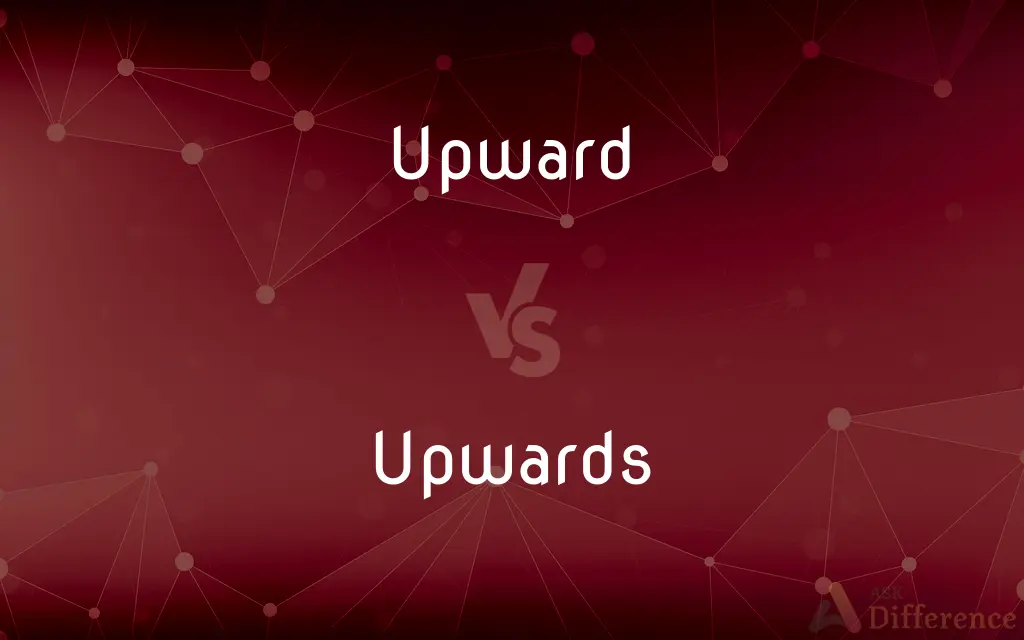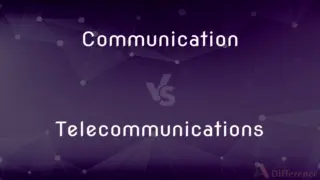Upward vs. Upwards — What's the Difference?
By Maham Liaqat & Fiza Rafique — Updated on March 27, 2024
"Upward" and "upwards" both describe a direction towards a higher position or level, but "upward" is often used as an adjective, while "upwards" is typically used as an adverb.

Difference Between Upward and Upwards
Table of Contents
ADVERTISEMENT
Key Differences
"Upward" is commonly employed to modify nouns and describe a direction of movement or growth that is towards a higher point. For instance, "upward trend" or "upward movement." On the other hand, "upwards" is used to describe the manner of an action, often following verbs, indicating movement in a higher direction, like in "moving upwards" or "glancing upwards."
In terms of usage, "upward" is more formal and is often found in written texts, reports, and formal speech, especially in American English. "Upwards," while also correct, tends to be more common in British English and is used more colloquially to describe actions or movements.
Both "upward" and "upwards" can be interchangeable in many contexts without significantly changing the meaning. The choice between them can depend on regional preferences, the grammatical role in the sentence, or stylistic considerations. For example, "The balloon floated upward" and "The balloon floated upwards" are both correct but might be preferred differently depending on the dialect.
The use of "upward" as an adjective before nouns to indicate direction or location contrasts with "upwards," which does not typically function in this adjectival capacity. This distinction highlights the slightly different roles these words can play in sentences, even though they share a common root and similar meanings.
Comparison Chart
Part of Speech
Adjective, sometimes adverb
Adverb
ADVERTISEMENT
Usage
Describes direction/movement towards a higher point or level
Describes the manner of action towards a higher direction
Example
"An upward glance" (Adjective); "The numbers are trending upward" (Adverb)
"The smoke rose upwards"
Preference
More formal, often used in American English
More common in British English, colloquial usage
Interchangeability
Often interchangeable with "upwards" in adverbial use
Can usually replace "upward" in adverbial contexts
Compare with Definitions
Upward
Pertaining to a movement or trend towards a higher place or level.
The graph shows an upward trajectory in sales.
Upwards
In a direction towards a higher point.
He looked upwards at the tall buildings.
Upward
Related to an increase in height or elevation.
The mountain path led us in an upward slope.
Upwards
Extending towards a higher limit or degree.
The age range of participants varied upwards from 18 years.
Upward
Indicating a higher position or alignment.
The plant's growth was upward, towards the sunlight.
Upwards
Moving through levels or stages towards a peak.
The hike involved several upwards stretches.
Upward
Reflecting improvement or advancement.
The project is moving in an upward direction.
Upwards
Signifying a rise in figures or quantities.
The temperature is going upwards of 30 degrees.
Upward
Symbolizing hope or positive expectation.
His spirits took an upward turn.
Upwards
Achieving greater height.
The balloon drifted upwards into the blue sky.
Upward
In, to, or toward a higher place, level, or position
Flying upward.
Upwards
Towards a higher place; towards what is above.
Upward
Toward a higher position in a hierarchy or on a socioeconomic scale
A young executive moving upward fast.
Upwards
To a higher figure or amount.
Upward
Toward the head or upper parts
Bare from the waist upward.
Upwards
Towards something which is higher in order, larger, superior etc.
Upward
Toward a higher amount, degree, or rank
Prices soared upward.
Upwards
Backwards in time, into the past.
Upward
Toward a later time or age
From adolescence upward.
Upwards
To or into later life.
Upward
Directed toward a higher place or position
Upward movement.
Upwards
Spatially or metaphorically from a lower to a higher position;
Look up!
The music surged up
The fragments flew upwards
Prices soared upwards
Upwardly mobile
Upward
In a direction from lower to higher; toward a higher place; in a course toward the source or origin
We ran upward
Upwards
To a later time;
They moved the meeting date up
From childhood upward
Upward
In the upper parts; above.
Upward
Yet more; indefinitely more; above; over.
Upward
(obsolete) The upper part; the top.
Upward
Directed toward a higher place.
With upward eye; with upward course
Upward
In a direction from lower to higher; toward a higher place; in a course toward the source or origin; - opposed to downward; as, to tend or roll upward.
Looking inward, we are stricken dumb; looking upward, we speak and prevail.
Upward
In the upper parts; above.
Dagon his name, sea monster, upward man,And down ward fish.
Upward
Yet more; indefinitely more; above; over.
From twenty years old and upward.
I have been your wife in this obedienceUpward of twenty years.
Upward
Directed toward a higher place; as, with upward eye; with upward course.
Upward
The upper part; the top.
From the extremest upward of thy head.
Upward
Directed up;
The cards were face upward
An upward stroke of the pen
Upward
Extending or moving toward a higher place;
The up staircase
A general upward movement of fish
Upward
Spatially or metaphorically from a lower to a higher position;
Look up!
The music surged up
The fragments flew upwards
Prices soared upwards
Upwardly mobile
Upward
To a later time;
They moved the meeting date up
From childhood upward
Common Curiosities
Is "upward" more correct than "upwards"?
Neither is more correct; usage depends on context, regional preference, and part of speech.
Can "upward" and "upwards" be used interchangeably?
Yes, in many cases, especially in adverbial use, but there may be regional or stylistic preferences for one over the other.
Are there contexts where only one of the terms is appropriate?
When used as an adjective, "upward" is the correct choice, e.g., in "upward movement." As an adverb, both can be appropriate, depending on the sentence structure and regional usage.
How do I know which to use in writing?
Consider your audience and the formality of the context. "Upward" is often preferred in formal American English writing, while "upwards" may be more common in informal or British contexts.
Do "upward" and "upwards" have the same meaning?
Essentially, yes. Both indicate direction or movement towards a higher point, though they differ slightly in grammatical function.
How does regional preference affect the choice between "upward" and "upwards"?
American English tends to favor "upward," especially as an adjective, while "upwards" is more commonly used in British English.
When should I use "upward" over "upwards"?
Use "upward" when modifying nouns or when a more formal tone is desired, particularly in American English contexts.
Does the choice between "upward" and "upwards" affect the clarity of communication?
Generally, no. The meaning is clear with either choice, though the selection can reflect the speaker's dialect or stylistic preference.
Can "upwards" function as an adjective?
Typically, "upwards" is used as an adverb. It's less common and generally not standard to use it as an adjective.
Can the usage of "upward" versus "upwards" change the tone of a sentence?
Subtly, yes. "Upward" might impart a slightly more formal tone, while "upwards" could feel more casual or conversational.
Share Your Discovery

Previous Comparison
Beside vs. Near
Next Comparison
Communication vs. TelecommunicationsAuthor Spotlight
Written by
Maham LiaqatCo-written by
Fiza RafiqueFiza Rafique is a skilled content writer at AskDifference.com, where she meticulously refines and enhances written pieces. Drawing from her vast editorial expertise, Fiza ensures clarity, accuracy, and precision in every article. Passionate about language, she continually seeks to elevate the quality of content for readers worldwide.














































